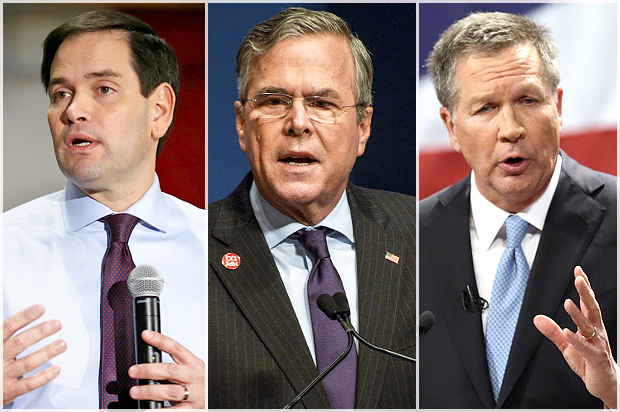For months now, the Republican establishment has been trying to put forth someone — anyone — who could both reasonably be elected in November and placate conservatives who are looking to select one of their own after the failed runs of Mitt Romney and John McCain. Scott Walker, Jeb Bush, Chris Christie, and Marco Rubio have all played this part in one way or another.
Enter John Kasich, who finished second in New Hampshire, and who will fill this role until he finishes at or near dead last in South Carolina. The big takeaway, however, is that the “sane Republicans” have chalked up another loss. For Reince Priebus and the Republican Party, it’s time to face facts: The GOP just can’t get conservative voters to buy what they’re selling.
Things have been trending this way for a long time. The defeat of John McCain in 2008 created the Tea Party as we know it today. By the time 2012 rolled around, the Republican campaign prior to March was characterized by different terrible candidates — Rick Santorum, Newt Gingrich, Herman Cain, Rick Perry — outflanking Romney on the right and giving him a serious challenge. When Romney lost in November, Cruz and his allies piled on, arguing that Romney’s “centrism” was the reason for Obama’s re-election.
The national party never really had a chance.
When Marco Rubio finished third in the Iowa caucus and managed to spin himself as some sort of “comeback kid” (despite consistently polling behind Trump and Cruz in Iowa throughout January), there was renewed hope among Republicans that Rubio could gather some momentum and overtake Trump and Cruz.
Rubio took this ball and promptly dropped it. He followed up a particularly awful debate performance on Saturday night with a terrible finish in New Hampshire, well behind Trump, Kasich, Cruz and possibly even Bush. Rubio, predictably, blamed his poor showing in New Hampshire on his debate performance, because the truth is a little more terrifying for him: hard-right Republicans don’t like or trust him.
With Republicans realizing that Rubio might not be the answer to their electability worries, Kasich seems like he might be a suitable option. The Ohio governor, however, poured nearly all of his resources and time into New Hampshire. He’s consistently polled with terrible support in South Carolina, and the last poll out of Nevada gave him less support than two candidates who have already dropped out, Rand Paul and Rick Santorum.
The problem for Kasich — and to a lesser extent, Rubio — is that he’s someone who’s both acceptable to the the New York Times and is given to McConnell-like levels of awareness that ultraconservatives are taking the Republican Party down an untenable path. In other words, he’s the establishment, or exactly the kind of politician who’s given rise to Donald Trump and Ted Cruz.
Even four years later, establishment conservatives still don’t see the writing on the wall. The New York Times’ Ross Douthat said, “Mitt Romney would have won this nomination in a walk,” ignoring the evidence that the Romney equivalents in this race — Kasich, Bush, Chris Christie — have all been afterthoughts in a campaign dominated by Trump and Cruz. Washington Post blogger Jennifer Rubin offered some free advice for Kasich, telling him to go to the Citadel and make a speech that no one will care about. In a dramatic twist, The Weekly Standard’s Bill Kristol seems relatively self-aware; after spending months propagating a bad hashtag about Trump’s imminent failure in the Republican race, he’s now using his powers of terrible prediction for good.
The single most likely GOP ticket at this point: Trump-Kasich.
The single most likely Dem ticket at this point: Sanders-Warren.— Bill Kristol (@BillKristol) February 10, 2016
Whatever the case, it’s clear that GOP conservatives haven’t just lost control of the party; they’ve also lost their grip on reality. In November, the party is in all likelihood going to put forth one of their two nightmare scenarios as the nominee, and they’re going to either have to fall in line behind someone who could very well suffer a Goldwater-like defeat in the general election, or grovel at the feet of Michael Bloomberg to save them.
Chances are they’ll be begging up until Election Day.

